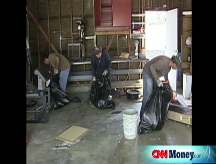FHA chief balks at taking on more bad loans
Federal Housing Administration Commissioner Brian Montgomery said a plan for his agency to take on two million at-risk loans could make the housing crisis worse.
NEW YORK (CNNMoney.com) -- A Bush administration official warned Monday that a proposal to have the government back more bad loans would hurt taxpayers and could make the housing crisis even worse.
Federal Housing Administration Commissioner Brian Montgomery told the National Press Club that Congress legislation proposing that the FHA back up to $300 billion worth of troubled mortgages - or about two million loans - would weaken the agency.
"This is a worrisome idea," Montgomery said. "FHA is designed to help stabilize the economy, operating within manageable, low-risk loans. It's not designed to become the federal lender of last resort, a mega-agency to subsidize bad loans."
Montgomery also argued that the agency has been "hobbled by low loan limits and higher down payment requirements," adding that the FHA "was literally priced out of some housing markets."
He said that the new, higher loan limits announced in March - which range from $271,000 to $729,000 - opened up the market for FHA loans in high priced areas and have already helped about 100,000 homeowners. He argued that higher loan limits should be made permanent to help the housing market.
Montgomery noted that the FHA has already begun pricing the loans it makes according to borrowers' risk levels - a first in the agency's 74-year history - and said that this policy should also be made permanent.
The conventional wisdom had been that charging higher-risk borrowers more would hurt those who need help the most. But Montgomery said such a policy is actually in line with FHA's mission to provide home financing for low income and minority home buyers.
"Contrary to conventional wisdom, FHA families with the lower incomes have higher FICO scores," he said. The target FHA client, then, the lower income American, would pay a lower rate for an FHA loan under risk-based pricing.
"These are hard-working American families who live within their means and pay their bills," said Montgomery.
Montgomery also is re-proposing a rule shot down in court last year that would end seller-financed down payments for any FHA-insured loan.
In these transactions, home sellers - or any entity that would profit from a sale - give 10% or 20% of the sale price to buyers, who can then use that cash as a down payment.
Seller-funded down payment loans now account for a third of all loans in FHA's portfolio, and Montgomery said the practice has contributed to the foreclosure crisis.
And the FHA reports that these loans are three times more likely to go into foreclosure than loans in which borrowers come up with their own down payments.
"We had to book an additional of $4.6 billion in unanticipated long-term losses, mostly due to the increased number of certain types of seller-funded loans in the FHA portfolio," said Montgomery.
These loans are much more risky, since the buyers don't have a down payment of their own. With little or none of their own money invested, they may be less able or less inclined to keep up with their mortgages payments should they run into trouble. They are also more inclined to walk away from their loans entirely, leaving lenders on the hook.
"We are concerned about this business [practice]," he said, "because the substantial losses affect FHA's bottom line and FHA's ability to serve American citizens who need access to prime-rate home loans." ![]()



